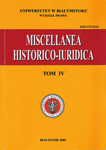Teoria karna Immanuela Kanta w poglądach Edmunda Krzymuskiego
Immanuel Kant's Penal Theory in Legal Views of Edmund Krzymuski
Author(s): Karol KuźmiczSubject(s): Law, Constitution, Jurisprudence, Penal Policy, Philosophy of Law
Published by: Wydawnictwo Uniwersytetu w Białymstoku
Summary/Abstract: The main task of the article is to describe the influence of Kant’s theory of law on Edmund Krzymuski’s (1851–1928) legal thinking. The critical philosophy of Immanuel Kant, especially his penal theory, was the main topic of interest in Krzymuski’s writings on philosophy of law. He was one of the most outstanding Polish penal lawyers in the end of 19th and the beginning of 20th century. He was analyzing Kant’s penal theory starting from Kant’s writings about practical ratio. He did it in his book published in 1881. Then he was trying to implement these views during works on constructing new Polish penal code. The most frequent reception of Kant’s thinking was connected with the definition of law as an element which connects freedom of individual and freedom of society. He was also referring to Kant’s construction of justice, theory of punishment and definition of crime.
Journal: Miscellanea Historico-Iuridica
- Issue Year: 4/2006
- Issue No: 1
- Page Range: 71-86
- Page Count: 16
- Language: Polish

